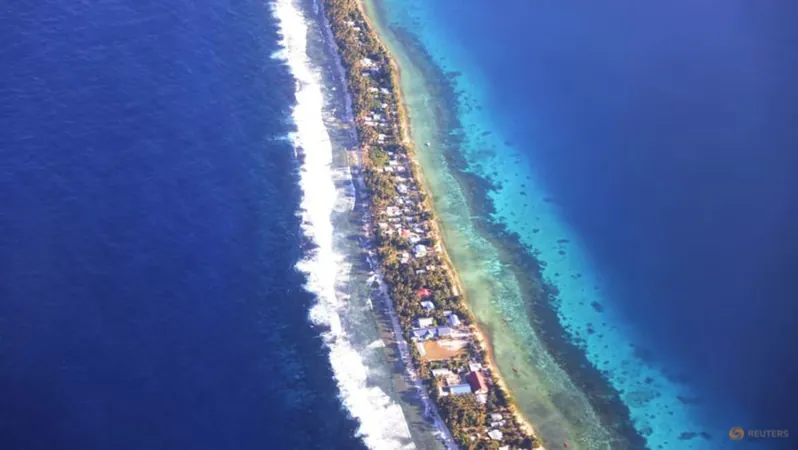
As Tuvalu Sinks Beneath the Waves, Its People Fight to Secure Their Future
2024-09-24
Author: Mei
FONGAFALE, TUVALU
The small nation of Tuvalu, home to just 11,000 residents living on nine fragile atolls in the Pacific Ocean, is running out of time as rising sea levels threaten its very existence. With each passing year, the dangers posed by climate change become increasingly palpable, leaving many residents questioning their future.
Fukanoe Laafai, a 29-year-old clerical worker, dreams of starting a family. Yet, as scientists warn that much of her homeland could be underwater by the time her children reach adulthood, a sense of urgency fills the air. "I think we are about to sink," she confides, reflecting the despair that many feel in this low-lying island nation.
With an average elevation of only 2 meters, Tuvalu has already seen a significant rise in sea levels—about 15 centimeters over the past three decades—over one and a half times the global average. NASA has projected a dire future: by 2050, half of Funafuti, Tuvalu's main atoll and home to 60 percent of the population, could be submerged under daily tides. The narrowness of the land, some parts barely reaching 20 meters, exacerbates the threat.
Residents have resorted to rainwater tanks and a central garden for food production due to the salinization of groundwater, making traditional agriculture unsustainable. In a landmark climate treaty with Australia announced in 2023, Tuvalu will allow 280 citizens to migrate there annually, starting next year. While migration offers a hopeful option, it does not sit well with many Tuvaluans, who fear the loss of their culture and community.
During a recent visit, journalists found that anxiety permeates daily life in Tuvalu as officials reveal a diplomatic plan aimed at ensuring the country retains its sovereignty, even if its land is consumed by rising waters. The goal is to amend international maritime laws to retain control over a vast exclusive economic zone that encompasses roughly 900,000 square kilometers—an area larger than California, rich in tuna and vital to Tuvalu's economy.
Amid frustration with the global response to their plight, Tuvalu's diplomats are pioneering new methods to secure their maritime boundaries. By changing international sea law, Tuvalu hopes to secure its rights even after its land becomes submerged. Deputy Prime Minister Panapasi Nelesone emphasized the crucial nature of these efforts, stating, "If the international community were to recognize Tuvalu's maritime boundaries as permanent, it would provide an economic lifeline."
An upcoming high-level United Nations meeting, where Prime Minister Feleti Teo will advocate for the recognition of Tuvalu's maritime boundaries and statehood, is seen as a pivotal moment in this struggle. As Tuvalu continues to navigate its precarious situation, its people are unyielding in their desire to preserve their identity, culture, and heritage. "To leave a country is to leave the culture you were born with,” says Maani Maani, a 32-year-old IT worker, illustrating the emotional toll of potential relocation.
While sea walls and artificial land initiatives are ongoing efforts to combat flooding, projections suggest that by the end of the century, rising sea levels could engulf as much as 90 percent of Funafuti, leaving only a small portion of the island above water.
As the world grapples with the implications of climate change, Tuvalu stands at the forefront of this existential crisis, advocating for legal recognition of its maritime rights. Its officials are actively engaging diplomatic partners while community members reflect on their shared values and the heartbreaking possibility of being scattered across other nations. In the face of such overwhelming challenges, Tuvalu remains a testament to resilience, a nation unwilling to vanish without a fight.

 Brasil (PT)
Brasil (PT)
 Canada (EN)
Canada (EN)
 Chile (ES)
Chile (ES)
 Česko (CS)
Česko (CS)
 대한민국 (KO)
대한민국 (KO)
 España (ES)
España (ES)
 France (FR)
France (FR)
 Hong Kong (EN)
Hong Kong (EN)
 Italia (IT)
Italia (IT)
 日本 (JA)
日本 (JA)
 Magyarország (HU)
Magyarország (HU)
 Norge (NO)
Norge (NO)
 Polska (PL)
Polska (PL)
 Schweiz (DE)
Schweiz (DE)
 Singapore (EN)
Singapore (EN)
 Sverige (SV)
Sverige (SV)
 Suomi (FI)
Suomi (FI)
 Türkiye (TR)
Türkiye (TR)
 الإمارات العربية المتحدة (AR)
الإمارات العربية المتحدة (AR)